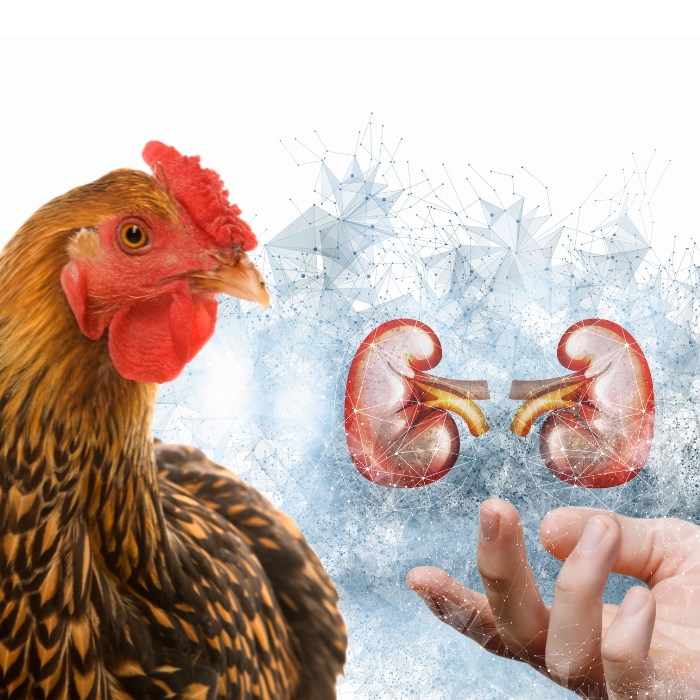
Kidney Diseases in Poultry: New, Natural Ways of Support
Kidney health plays a crucial role in poultry production, yet renal diseases in broilers and layers often go unnoticed until they result in serious health issues and economic losses. With increasing intensification in poultry farming, kidney-related problems are becoming more frequent due to nutritional imbalances, environmental stress, and infectious agents. Fortunately, advances in herbal veterinary solutions—such as Nephroboost, a natural liquid supplement—offer promising support for maintaining optimal kidney function.
Understanding the Role of Kidneys in Poultry
In birds, the kidneys serve several critical functions:
- Excreting nitrogenous waste as uric acid (unlike mammals, birds do not excrete urea).
- Regulating water and electrolyte balance.
- Filtering out toxins and drug residues.
- Supporting blood pressure and acid-base regulation.
When kidney function deteriorates, the bird’s system cannot eliminate waste efficiently, resulting in toxic buildup. This condition often manifests as gout, urolithiasis (uric acid stone formation), nephritis, or fluid retention (ascites), all of which negatively affect the bird’s health and productivity.
Common Renal Disorders in Poultry
When kidney function is compromised, waste materials like uric acid can accumulate, leading to a range of serious health problems. In commercial broiler and layer operations, several renal disorders are commonly observed.
- Visceral and Articular Gout
Visceral gout occurs when uric acid crystals deposit on organs such as the heart, liver, and kidneys. Articular gout, on the other hand, affects joints, leading to swelling and lameness.
Primary causes include:
- High dietary calcium (especially in young birds or during pre-lay).
- Excess dietary protein.
- Imbalance in calcium-phosphorus ratios.
- Dehydration due to poor water access or high temperature.
- Nephrotoxic drugs or mycotoxins.
- Viral infections such as Infectious Bronchitis Virus (IBV) or Astrovirus.
- Deficiencies in vitamins A and D.
- Urolithiasis
Urolithiasis is the formation of urate stones in the ureters or kidney tissues, often resulting in blockage. Birds with urolithiasis may suffer from kidney failure, especially if hydration or electrolyte balance is poor.
- Nephritis (Kidney Inflammation)
Viral infections or long-term exposure to toxins may lead to nephritis, characterized by inflamed kidney tissues. Though often subclinical in early stages, it can progress rapidly under stress.
- Ascites and Kidney Stress
In broilers, metabolic disorders like ascites increase the burden on kidneys due to oxygen deficit and high metabolic rates, leading to excessive uric acid formation and fluid retention.
Recognizing the Symptoms
Kidney diseases in poultry are often hard to detect in the early stages. However, the following signs can be helpful indicators:
- Lethargy and reluctance to move.
- Reduced feed and water intake.
- Pale combs and wattles.
- Weight loss and poor growth.
- Swollen joints (in articular gout).
- Sudden deaths, especially in broilers.
- Necropsy revealing white urate deposits on organs (visceral gout).
In laboratory diagnostics, elevated uric acid levels (hyperuricemia), creatinine, and urea are markers of impaired renal function.
Economic and Welfare Impact
Kidney disease can have a severe impact on flock performance:
- Increased mortality and culling.
- Poor weight gain and feed conversion in broilers.
- Reduced egg production in layers.
- Higher rates of carcass condemnation.
- Increased veterinary and treatment costs.
- Welfare concerns due to chronic pain or sudden deaths.
For commercial producers, even a small increase in renal disease prevalence can lead to significant financial losses.
Prevention Through Management
Controlling renal disease in poultry requires a combination of good husbandry, nutrition, and biosecurity.
Key preventive steps include:
- Providing clean, cool, and readily available drinking water.
- Avoiding excess calcium in pre-lay pullets.
- Ensuring balanced calcium-to-phosphorus and protein levels.
- Preventing mycotoxin contamination in feed.
- Avoiding or closely managing nephrotoxic medications.
- Vaccinating against nephrotropic viruses like IBV.
- Maintaining proper environmental temperatures to prevent dehydration or heat stress.
Herbal Kidney Support: The Role of Nephroboost
Modern poultry farming is turning increasingly toward natural solutions that support organ health without the drawbacks of synthetic drugs. One such innovation is Nephroboost, a unique herbal oral liquid formulated specifically to support kidney function in poultry.
What Is Nephroboost?
Nephroboost was specifically developed to enhance kidney health in broilers and layers through the power of selected medicinal herbs. It contains a blend of natural diuretics and nephroprotective compounds that promote kidney detoxification and uric acid elimination.
Key Benefits of Nephroboost:
- Enhances diuresis: Promotes flushing of the kidneys and urinary tract to reduce uric acid accumulation.
- Supports nephron function: Encourages regeneration and protects the functional units of the kidneys.
- Helps dissolve urate deposits: Aids in breaking down early-stage urate crystals, potentially reversing mild cases of gout.
- Supports fluid balance: Useful during ascites or stress-related fluid retention.
- Stabilizes biochemical markers: Assists in maintaining normal levels of creatinine, BUN, GFR, and serum uric acid.
When to Use:
- During early signs of renal distress or gout.
- As a preventive support during heat stress, dehydration, or high dietary protein phases.
- Alongside other supportive treatments and improved management practices.
Integrating a kidney-supportive product like Nephroboost into poultry management protocols offers a proactive and natural way to support renal function. While it’s not a replacement for good husbandry, it can be a valuable tool in mitigating risk and enhancing bird resilience.
For modern poultry operations striving to balance performance and health of the flocks, Nephroboost represents a practical and completely natural step forward.
